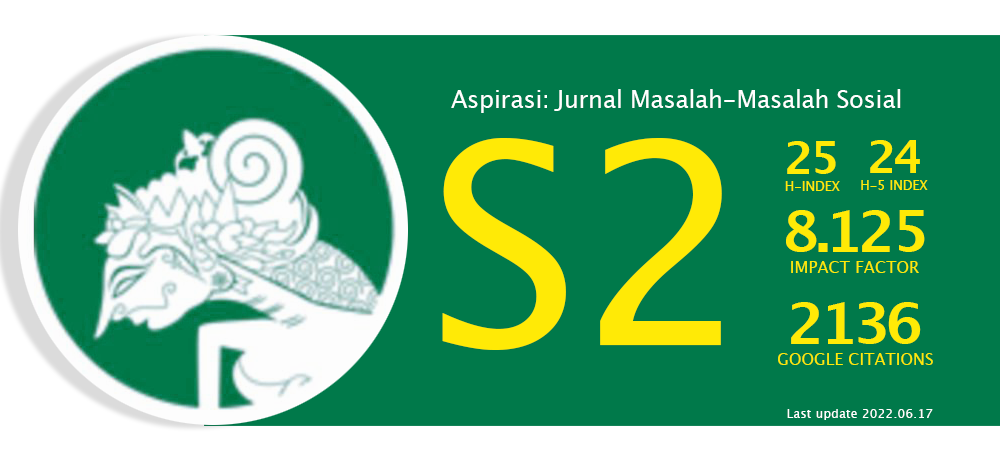Implementasi Gerakan Kesejahteraan Sosial sebagai Model Praktik Makro Pekerjaan Sosial: Studi pada Persyarikatan Muhammadiyah Kota Malang
Abstract
Efforts to achieve social welfare must be organized through social welfare movements by encouraging the participation of communities and social organizations. This study examines the implementation and processes of the social welfare movement conducted by Persyarikatan Muhammadiyah in Malang City, East Java, as a model of macro social work practice. Using a qualitative method with a case study approach, the research involved four administrators of the Muhammadiyah Regional Leadership in Malang City, selected purposively as subjects. Data were collected through observation, interviews, and documentation, then analyzed using the interactive model of Miles, Huberman, and Saldana. The findings reveal that the implementation of the social welfare movement is influenced by organizational factors, leadership, resources, networks, community participation, strategies, and movement objectives. Persyarikatan Muhammadiyah has effectively provided social services, education, healthcare, and community empowerment to address various social issues. This study recommends that the government develop social welfare movement programs involving collaboration with community organizations, provide accurate data on social welfare organizations as strategic partners, and ensure, through Commission VIII of the Indonesian Parliament (DPR RI), that social welfare programs are implemented systematically, effectively, and efficiently. Furthermore, formal regulations should guarantee the active involvement of community organizations in the development of social welfare programs.
Abstrak
Upaya mewujudkan kesejahteraan sosial perlu dilakukan secara terorganisir melalui gerakan kesejahteraan sosial dengan mendorong partisipasi masyarakat dan organisasi sosial. Penelitian ini menggambarkan implementasi dan proses gerakan kesejahteraan sosial yang dilakukan oleh Persyarikatan Muhammadiyah di Kota Malang, Jawa Timur, sebagai model praktik makro pekerjaan sosial. Dengan menggunakan metode kualitatif dan pendekatan studi kasus, penelitian ini melibatkan empat pengurus Pimpinan Daerah Muhammadiyah Kota Malang yang dipilih secara purposif sebagai subjek. Data dikumpulkan melalui observasi, wawancara, dan dokumentasi, kemudian dianalisis menggunakan model interaktif Miles, Huberman, dan Saldana. Hasil penelitian menunjukkan bahwa implementasi gerakan kesejahteraan sosial dipengaruhi oleh faktor organisasi, kepemimpinan, sumber daya, jaringan, partisipasi masyarakat, strategi, dan tujuan gerakan. Persyarikatan Muhammadiyah telah berhasil memberikan layanan sosial, pendidikan, kesehatan, dan pemberdayaan masyarakat untuk mengatasi berbagai masalah sosial. Penelitian ini merekomendasikan agar pemerintah menyusun program gerakan kesejahteraan sosial yang melibatkan kolaborasi dengan organisasi masyarakat, menyediakan data yang akurat terkait organisasi gerakan kesejahteraan sosial sebagai mitra strategis, serta memastikan, melalui Komisi VIII DPR RI, bahwa program kesejahteraan sosial dilaksanakan secara sistematis, efektif, dan efisien. Selain itu, perlu ada regulasi formal yang menjamin keterlibatan aktif organisasi masyarakat dalam pembangunan program kesejahteraan sosial.
Keywords
Full Text:
PDFReferences
Astri, H. (2013). Pengaturan praktik pekerja sosial profesional di Indonesia. Aspirasi: Jurnal Masalah-Masalah Sosial, 4(2), 155–163. https://doi.org/10.46807/aspirasi.v4i2.499
Austin, M. J., Anthony, E. K., Knee, R. T., & Mathias, J. (2016). Revisiting the relationship between micro and macro social work practice. Families in Society: The Journal of Contemporary Social Services, 97(4), 270–277.
Babbie, E. R. (2008). The basics of social research. Thomson Wadsworth.
Brieland, D., Costin, L. B., & Atherton, C. R. (1975). Contemporary social work: An introduction to social work and social welfare. McGraw-Hill.
Denzin, N. K., & Lincoln, Y. S. (2009). Handbook of qualitative research. McGraw-Hill.
Greene, S. (2002). Sociology and you. McGraw-Hill.
Locher, D. A. (2002). Collective Behavior. Prentice Hall.
Macionis, J. J. (2012). Sociology. Pearson/Prentice Hall.
Marvasti, A. (2003). Qualitative research in sociology. SAGE Publications.
McBeath, B. (2016). Re-envisioning macro social work practice. Families in Society, 97(1), 5–14. https://doi.org/10.1606/1044-3894.2016.97.9
Miles, M. B., Huberman, A. M., & Saldana, J. (2014). Qualitative data analysis, a methods sourcebook (T. R. Rohidi, Trans.; 3rd ed.). UI Press.
Moleong, L. J. (2007). Metodologi penelitian kualitatif. Penerbit PT Remaja Rosdakarya Offset.
Mulyadi, M. (2012). Organisasi masyarakat (ormas) Dompet Dhuafa dalam perspektif pemberdayaan masyarakat. Aspirasi: Jurnal Masalah-Masalah Sosial, 3(2), 167–177. https://doi.org/10.46807/aspirasi.v3i2.267
Neuman, W. L. (2007). Basics of social research: Qualitative and Quantitative approaches. Pearson/Allyn and Bacon.
Noble, C. (2015). Social protest movements and social work practice. In International Encyclopedia of the Social & Behavioral Sciences (2nd ed., pp. 518–524). Elsevier.
Rahman, A., Wasistiono, S., Riyani, O., & Tahir, I. (2023). Peran organisasi masyarakat (ormas) dan lembaga swadaya Masyarakat (LSM) dalam pembangunan berkelanjutan di Indonesia. Ekonomis: Journal of Economics and Business, 7(2), 1461–1471. http://dx.doi.org/10.33087/ekonomis.v7i2.1492
Reisch, M. (2016). Why macro practice matters. Journal of Social Work Education, 52(3), 258–268. https://doi.org/10.1080/10437797.2016.1174652
Stolley, K. (2005). The basics of sociology. Bloomsbury Academic.
Sukmana, O. (2016). Konsep dan teori gerakan sosial. Intrans Publishing.
Surya, F. P. (2024). Peran organisasi masyarakat dalam harmonisasi sosial. Kompasiana.com. https://www.kompasiana.com/fatihahputrisurya8304/660d09bdc57afb3b0620eea2/peranorganisasi- masyarakat-dalam-harmonisasi-sosial?page=all&page_images=1
Thompson, N. (2002). Social movements, social justice and social work. British Journal of Social Work, 32(6), 711–722. https://doi.org/10.1093/bjsw/32.6.711
DOI: https://doi.org/10.46807/aspirasi.v15i2.3347
Refbacks
- There are currently no refbacks.








